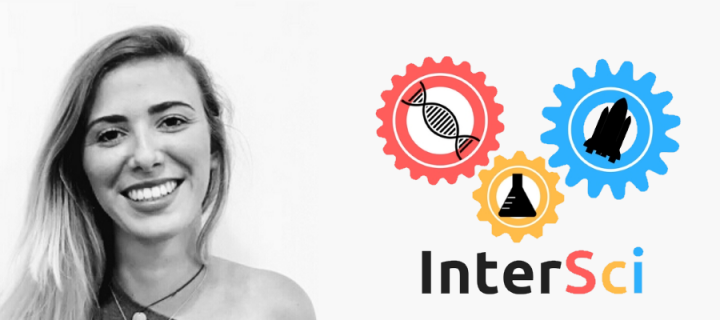Feature: Amelia Hallas-Potts on the importance of interdisciplinarity
By doing an interdisciplinary PhD and organising InterSci, Amelia is viewing her science through many lenses. Réka Nagy zooms in on her in this feature. November 2017

“As a Scientist, it is easy to get stuck in your bubble and not consider the patients, public or other scientists who could all make valuable contributions to your project”
After completing her BSc in Neuroscience, Amelia Hallas-Potts felt that she could only answer a limited range of scientific questions
and was missing out on all the other sciences. Amelia wanted to learn how to tackle scientific questions using a variety of approaches, so she started her OPTIMA (Optical Medical Imaging) PhD in September 2016. Amelia is building a light sheet microscope that will enable her to track the process of ovarian cancer invasion live, in 3D.
Her PhD programme brings together biology, engineering, physics and microscopy, along with business courses that will also lead to an MBA at the end of the four-year programme. It also encourages public engagement, and enabled Amelia to take part in Explorathon – European Researchers’ Night in September 2017, as well as the Edinburgh Science Festival’s Mini Maker Faire in April 2017.
Thanks to a chance introduction by a colleague, and a vacant post she had the right skills for, Amelia became Marketing Director at the Edinburgh branch of the Innovation Forum, which aims to create links between academia and industry. Led by Amelia, four members of the forum, who are all postgraduate students based at different sites across Edinburgh, have banded together to form InterSci, a new informal forum established to facilitate conversations between scientists and public audiences. The initial concept stemmed from the realisation that researchers often have no idea what the people they are working alongside actually do.
Through InterSci, Amelia wants to help scientists diversify their research by getting to know, and collaborate with, researchers in other fields, and to engage the public with research that is happening in Edinburgh. While the first InterSci series was primarily attended by students, Amelia hopes that the audience will expand and aims to keep the conversations inclusive to non-expert audiences by providing the audience with jargon flags to raise when the conversation becomes too technical.
Amelia’s efforts clearly benefit other researchers and the wider society, as well as providing personal benefits by developing new skills. InterSci is helping her to build her professional network and to hone her networking skills. Knowing who to turn to for specialist help is essential for her highly interdisciplinary PhD project, and interacting with scientists from different fields helps her see the bigger picture. Amelia has also become a more confident public speaker, which is a great skill for any PhD student to have, as she is expected to regularly present talks and posters to scientific and lay audiences.
Links
OPTIMA: The EPSRC and MRC Centre for Doctoral Training in Optical Medical Imaging
Find and book free tickets for an InterSci: Ask a Scientist event

